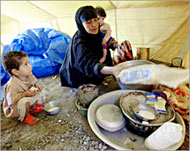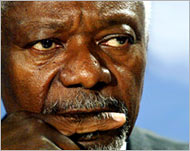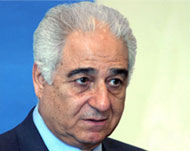Half of oil-for-food firms paid bribes
Half of the 4500 companies that took part in the UN oil-for-food programme in Iraq allegedly paid kickbacks or illegal surcharges and are being given a chance to respond to the accusations.

The UN-backed investigation will wrap up its work with a major report in early September on the US$64 billion operation and a final report in October on the companies involved in the purchase of Iraqi oil or sale of humanitarian goods under the programme, two top investigators told The Associated Press.
“We will report on the management and the corruption,” former US Federal Reserve chairman Paul Volcker, who heads the investigation, said in an interview on Monday.
“We will talk about the benefits and the shortfall.”
The oil-for-food programme, launched in December 1996 to help ordinary Iraqis cope with UN sanctions imposed after Saddam Hussein’s 1990 invasion of Kuwait, was one of the largest humanitarian programmes in history.
By most accounts, it achieved what it set out to do, becoming a lifeline for 90% of the country’s population of 26 million.
Profit vouchers
Under the programme, Saddam’s government could sell oil, provided the proceeds went primarily to buy humanitarian goods or pay war reparations.
 |
|
The scheme was aimed at helping |
Saddam allegedly sought to curry favour by giving former government officials, activists, journalists and others vouchers for Iraqi oil that could then be resold at a profit.
Volcker said “the definitive list” of more than 4500 private contractors involved in the programme will include for the first time the entities behind so-called front companies.
“It will provide information of known or alleged beneficiaries of oil allocations or purchase contracts, and it will report the apparent payment of illicit surcharges on oil contracts and kickbacks on humanitarian contracts,” Volcker told a news conference Monday.
Evidence of kickbacks
Former Yugoslav war crimes prosecutor Richard Goldstone, a member of Volcker’s Independent Inquiry Committee, said in an interview afterwards that in a lot of the contracts there were side letters.
Many of these letters contained “evidence of kickbacks, and these were all in violation of the Security Council resolution” that established the oil-for-food programme, and in many cases in violation of the law, he said.
Before making allegations of illegal actions against companies, Goldstone said, “we are going through the painstaking process of giving them prior notice, and giving them the opportunity of saying why this would be unfair and incorrect.”
Asked how many of the 4500 companies were affected, Goldstone said, “we’re giving letters to about half of them.”
He said a substantial amount of evidence of kickbacks came from Iraqi files, and “a lot from UN documents,” adding that some evidence also came from the committee’s investigations.
Catch 22
In the October report, Goldstone said, “we will be selecting some companies for in-depth treatment to show how the Saddam regime used the oil programme to solicit favours from government.”
 |
|
Kofi Annan may have known |
Volcker said the investigation was caught in a “Catch 22” because its final report on Secretary-General Kofi Annan’s role in oil-for-food and recommendations for UN reform would be issued just weeks before a summit of world leaders in mid-September to overhaul the world body.
“I wish this report was out two months ago,” he said in an interview. “It comes late and it complicates it.”
The third report by Volcker’s committee released on Monday said new emails suggesting Annan knew more than he had said about a company which employed his son, Kojo, and won an oil-for-food contract “clearly raises further questions.”
Volcker’s eagerly awaited final assessment on Annan’s involvement could have a major impact on the UN summit and the secretary-general’s completion of his second five-year term, which ends on 31 December 2006.
Need for reform
Mark Malloch Brown, the secretary-general’s chief of staff, told reporters on Monday that Annan expected “vindication” in the September report.
The timing may even be a good thing, though in an ideal world nobody would want a report of that magnitude “raining on your parade just a couple of weeks before a global summit,” he said.
 |
|
Oil-for-food chief Benon Sevan is |
On the positive side, Malloch Brown said, “it won’t leave the secretary-general going into the summit with this unresolved cloud over his head, of what did he know when.”
He said Volcker’s accusation that oil-for-food chief Benon Sevan took $147,184 in illegal kickbacks and Monday’s guilty plea by UN procurement official Alexander Yakovlev for soliciting an oil-for-food bribe and pocketing hundreds of millions of dollars in bribes on other contracts, demonstrate the need for deep-rooted management reform of the United Nations.
Malloch Brown accused the 191 UN member states of using the management issue as a “political football” in negotiations on a declaration to be adopted by world leaders at the summit.
“Maybe Mr Volcker can give us what’s needed to lift this issue above politics and say, this UN that we all believe in badly needs a strengthening of its management systems,” he said.
Volcker and Goldstone promised that management reforms would definitely be a focus of their recommendations in the September report.